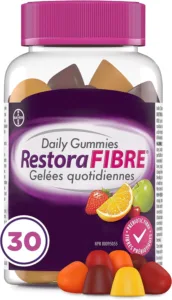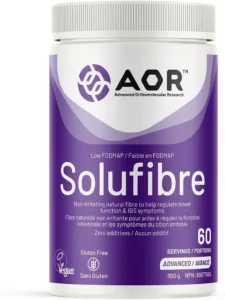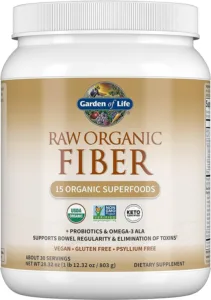
Living with irritable bowel syndrome (IBS) can be challenging, but finding the right dietary choices can make a significant difference in managing symptoms and improving quality of life. In particular, incorporating fiber into your diet can have a profound impact on your digestive health. In this comprehensive guide, we will explore the best types of fiber for IBS and how to incorporate them into your diet effectively.
Top 3 Best Fiber Supplements for IBS
- AOR – SoluFibre. Designed for targeted IBS relief, addressing symptoms like constipation, bloating, and discomfort. Formulated with partially hydrolyzed guar gum, it supports healthy digestion without irritation, making it one of the most well-tolerated fibers, and it’s low FODMAP compliant. This clinically studied and patented fiber provides comprehensive digestive support, nurturing a balanced digestive system and promoting overall wellness. Beyond IBS relief, Sunfiber contributes to cardiovascular health, by being corn-free, gluten-free, non-GMO, soy-free, and vegan. Tailored for all, it meets the unique needs of both men and women, offering convenient prebiotic fiber support. Formulated and made in Canada.
- RestoraFIBRE Daily Prebiotic Fibre Gummies. Offers a convenient daily fiber supplement to promote regularity, provide gentle constipation relief, and support digestive health. Made with naturally sourced inulin, a prebiotic fiber, these gummies encourage healthy bacteria growth in the gut. With just two gummies taken twice daily, you get 8 grams of prebiotic fiber to meet your daily requirements when diet alone falls short. Each dose contains less than 1 gram of sugar, making it suitable for those seeking constipation relief. Enjoy the delicious taste of six fruit flavors per bottle, making your daily fiber routine a tasty treat.
 RestoraFIBRE Daily Prebiotic Fibre Gummies
RestoraFIBRE Daily Prebiotic Fibre Gummies
- Raw Organic Superfood Fiber. A versatile fiber supplement suitable for adults and kids aged 4 and up. It supports bowel regularity and toxin elimination, providing 9g of fiber per serving, along with 8 grams of protein, probiotics, and Omega 3 fatty acids for overall health. This superfood fiber is made with 15 Raw and Certified Organic ingredients, including sprouted seeds, grains, and legumes like Flax, Quinoa, and Chia—free from filler ingredients and sugar. Offering constipation relief, it supports healthy gut flora balance and regular bowel function without harsh fibers like psyllium. Third-Party Certified USDA Organic, Non-GMO, Keto, Paleo Friendly, NSF Gluten-Free, and Vegan, this unflavored fiber supplement is easy to mix into water, smoothies, juice, cereal, yogurt, or other favorite foods.
Understanding IBS: A Brief Overview
Before diving into the details of fiber and its benefits for IBS, let’s first have a brief overview of what IBS is. IBS, or Irritable Bowel Syndrome, is a common digestive disorder that affects the large intestine. It is estimated that IBS affects up to 15% of the global population, making it one of the most prevalent gastrointestinal conditions worldwide.
IBS is a chronic condition that requires ongoing management. It is important to understand that IBS is a diagnosis of exclusion, meaning that other underlying conditions must be ruled out before a diagnosis of IBS is made. This is why it is crucial to consult with your healthcare professional if you experience persistent symptoms such as abdominal pain and changes in bowel movements.
What is IBS?
IBS is a complex disorder with a wide range of symptoms. It is often referred to as a functional gastrointestinal disorder, which means that it affects the normal functioning of the digestive system without causing any structural abnormalities. While the exact cause of IBS is unknown, factors such as stress, certain foods, and imbalances in the gut microbiome are believed to contribute to its development.
IBS is characterized by abdominal pain, bloating, gas, and changes in bowel movements, such as diarrhea, constipation, or both. These symptoms can vary from person to person and can range from mild to severe. Some individuals may experience predominantly diarrhea, while others may have more constipation. There are also cases where individuals alternate between diarrhea and constipation.
Common Symptoms of IBS
The symptoms of IBS can have a significant impact on daily life. In addition to the physical discomfort, individuals with IBS may experience a range of other symptoms, including fatigue, nausea, and even urinary symptoms. The unpredictable nature of symptoms can make it difficult to engage in social activities, travel, or even leave the house. The physical discomfort and distress caused by IBS symptoms can also affect mental and emotional well-being.
Understanding your specific symptoms can help you and your healthcare professional develop an effective treatment plan. It is important to keep track of your symptoms and any triggers that may worsen them. This can help identify patterns and guide treatment decisions.
The Impact of IBS on Daily Life
Living with IBS can significantly impact everyday life. The symptoms of IBS can be disruptive and make it challenging to maintain a normal routine. Individuals with IBS may find themselves constantly worrying about finding a bathroom or experiencing embarrassment due to excessive gas or bloating.
Furthermore, the physical discomfort and pain caused by IBS can have a negative impact on mental and emotional well-being. Many individuals with IBS report feeling anxious, depressed, or isolated due to their condition. It is important to seek support from healthcare professionals, support groups, or therapists who can provide guidance and help manage the emotional toll of living with IBS.
Developing strategies to manage symptoms and finding dietary interventions, such as incorporating fiber, can help regain control and improve overall quality of life. It is important to work closely with your healthcare professional to develop an individualized treatment plan that addresses your specific needs and goals.
The Role of Fiber in Digestive Health
Fiber plays a crucial role in maintaining digestive health, regardless of whether you have IBS or not. It is a type of carbohydrate that is not digested by the body. Instead, it passes through the digestive tract relatively intact, adding bulk to the stool and helping regulate bowel movements. Fiber also acts as a prebiotic, nourishing beneficial gut bacteria and promoting a healthy gut microbiome.
Did you know that fiber comes from plant-based foods such as fruits, vegetables, whole grains, legumes, and nuts? These foods are not only rich in fiber but also provide essential vitamins, minerals, and antioxidants that support overall health.
The Importance of Fiber
Incorporating adequate amounts of fiber into your diet is essential for various aspects of health, including the prevention of constipation, promoting regularity, and maintaining a healthy weight. Additionally, fiber can help manage blood sugar levels, lower cholesterol levels, and reduce the risk of certain chronic diseases, such as heart disease and type 2 diabetes.
When it comes to preventing constipation, fiber acts as a natural laxative. It adds bulk to the stool, making it easier to pass through the digestive system. This can help alleviate discomfort and reduce the likelihood of developing hemorrhoids.
Furthermore, fiber aids in weight management by promoting a feeling of fullness. When you consume fiber-rich foods, they take longer to digest, keeping you satisfied for longer periods and reducing the chances of overeating.
Different Types of Fiber
There are two main types of fiber: soluble fiber and insoluble fiber. Soluble fiber dissolves in water and forms a gel-like substance in the digestive tract. It helps regulate bowel movements and can be beneficial for managing diarrhea. Some examples of soluble fiber-rich foods include oats, beans, lentils, and fruits like apples and oranges.
On the other hand, insoluble fiber does not dissolve in water and adds bulk to the stool. It can be helpful for managing constipation. Foods high in insoluble fiber include whole wheat products, bran, nuts, and vegetables like broccoli and carrots.
It’s important to consume a variety of fiber-rich foods to ensure you’re getting both types of fiber and reaping the benefits they offer.
How Fiber Affects the Gut
In addition to promoting regular bowel movements, fiber plays a vital role in the gut microbiome. The gut microbiome refers to the collection of bacteria, viruses, fungi, and other microorganisms that reside in the digestive tract. These microorganisms play a crucial role in various aspects of health, including digestion, nutrient absorption, immune function, and even mental health.
Consuming fiber-rich foods provides nourishment for these beneficial gut bacteria, helping maintain a healthy balance. When the gut microbiome is in good shape, it can better support overall health and prevent the overgrowth of harmful bacteria.
Furthermore, a healthy gut microbiome has been linked to a stronger immune system. The beneficial bacteria in the gut help train the immune system to recognize and respond appropriately to harmful pathogens, reducing the risk of infections and autoimmune disorders.
It’s fascinating to think that something as simple as fiber can have such a profound impact on our digestive health and overall well-being. So, the next time you plan your meals, make sure to include a variety of fiber-rich foods to support your gut and keep your digestive system running smoothly!
Fiber and IBS: The Connection
Many individuals with Irritable Bowel Syndrome (IBS) find that incorporating fiber into their diet can help alleviate symptoms and improve overall digestive health. However, it is important to note that not all types of fiber may be suitable for everyone with IBS. It is essential to understand how fiber can help with IBS and determine the right amount and type of fiber for your individual needs.
IBS is a chronic gastrointestinal disorder that affects the large intestine. It is characterized by symptoms such as abdominal pain, bloating, gas, diarrhea, and constipation. While the exact cause of IBS is unknown, it is believed to be a combination of factors, including abnormal muscle contractions in the intestines, increased sensitivity to pain, and disturbances in the gut-brain axis.
How Fiber Can Help IBS
Fiber can provide several benefits for individuals with IBS. Soluble fiber, in particular, can help regulate bowel movements and reduce diarrhea by absorbing excess water in the digestive tract. This can help to create more formed and well-formed stools, reducing the urgency and frequency of bowel movements.
Insoluble fiber, on the other hand, can add bulk to the stool, making it easier to pass and alleviating constipation. It acts as a natural laxative, promoting regularity and preventing the discomfort associated with constipation. By including both soluble and insoluble fiber in your diet, you can help to balance your bowel movements and improve overall gut health.
Additionally, both types of fiber can promote a healthy gut microbiome, which may contribute to an improvement in IBS symptoms. The gut microbiome is a complex community of microorganisms that reside in the digestive tract. It plays a crucial role in digestion, nutrient absorption, and immune function. By consuming fiber-rich foods, you can provide nourishment to the beneficial bacteria in your gut, helping to maintain a healthy balance and potentially reducing IBS symptoms.
The Right Amount of Fiber for IBS Patients
While fiber can be beneficial for individuals with IBS, it is essential to introduce it gradually and monitor its effects on symptoms. Too much fiber, especially if introduced abruptly, can cause gastrointestinal distress and exacerbate symptoms such as bloating and gas.
Working with a healthcare professional or a dietitian specializing in IBS can help determine the right amount of fiber for your individual needs and guide you through the process of incorporating it into your diet. They can assess your current dietary habits, consider your specific symptoms and medical history, and provide personalized recommendations.
It is also important to note that the type of fiber you consume can affect your symptoms. Some individuals with IBS may be more sensitive to certain types of fiber, such as those found in wheat, rye, and barley (known as FODMAPs). These individuals may benefit from a low-FODMAP diet, which restricts certain types of carbohydrates that can trigger IBS symptoms. A healthcare professional or dietitian can help you determine if a low-FODMAP diet is appropriate for you and guide you through the process.
Incorporating fiber into your diet can be a beneficial strategy for managing IBS symptoms and improving overall digestive health. By understanding the different types of fiber and working with a healthcare professional, you can determine the right amount and type of fiber for your individual needs, helping to alleviate symptoms and promote a healthier gut.
Best Types of Fiber for IBS
The best types of fiber for individuals with Irritable Bowel Syndrome (IBS) are those that are easily tolerated and do not exacerbate symptoms. Soluble fiber tends to be better tolerated than insoluble fiber for most IBS patients. Let’s explore the benefits and sources of soluble and insoluble fiber in more detail.
Soluble Fiber: Benefits and Sources
Soluble fiber plays a crucial role in managing IBS symptoms. It absorbs water and forms a gel-like substance in the digestive tract, which helps regulate bowel movements and ease diarrhea. This gentle and soothing effect on the intestines can provide much-needed relief for those with IBS.
Good sources of soluble fiber include fruits such as apples, bananas, and berries. These fruits not only provide fiber but also contain essential vitamins and antioxidants that promote overall digestive health. Vegetables like carrots and potatoes are also excellent sources of soluble fiber, offering a wide range of nutrients to support gut function.
Legumes such as lentils and beans are another great option for individuals with IBS. They are not only rich in soluble fiber but also provide a good amount of protein, making them a nutritious addition to any diet. Additionally, oats and barley are well-known sources of soluble fiber that can be easily incorporated into meals, such as oatmeal or barley salads.
Insoluble Fiber: Benefits and Sources
While soluble fiber is generally more well-tolerated by IBS patients, insoluble fiber also has its benefits. Insoluble fiber adds bulk to the stool, making it easier to pass and alleviating constipation, which is a common symptom experienced by individuals with IBS.
Foods rich in insoluble fiber include whole grains, nuts, seeds, and vegetables like broccoli and cauliflower. Whole grains, such as whole wheat bread and brown rice, not only provide insoluble fiber but also offer a range of other nutrients like vitamins, minerals, and antioxidants.
Nuts and seeds, such as almonds, flaxseeds, and chia seeds, are not only excellent sources of insoluble fiber but also contain healthy fats that support gut health. Adding a handful of these nutritious snacks to your diet can provide a satisfying crunch while promoting regular bowel movements.
It is important to note that while insoluble fiber can be beneficial for many individuals with IBS, some may find that it worsens their symptoms. Each person’s response to fiber may vary, so it is best to observe your body’s reaction and adjust your intake accordingly. Consulting with a healthcare professional or registered dietitian can also provide personalized guidance on the best types and amounts of fiber for your specific needs.
Incorporating Fiber into Your IBS Diet
When it comes to incorporating fiber into your IBS diet, it is essential to do so gradually to allow your body to adjust. Let’s explore some strategies to help you effectively increase your fiber intake.
Fiber plays a crucial role in maintaining a healthy digestive system. It adds bulk to your stool, making it easier to pass through your intestines. For individuals with Irritable Bowel Syndrome (IBS), increasing fiber intake can help alleviate symptoms such as constipation or diarrhea.
Gradually Increasing Fiber Intake
Start by slowly increasing your intake of fiber-rich foods, allowing your body to adapt. Keep track of your symptoms and make adjustments as needed. It can be helpful to introduce one fiber-rich food at a time and monitor its effects on your digestive health.
For example, you could begin by adding a serving of fresh berries to your breakfast. Berries are not only delicious but also packed with fiber. Over time, you can gradually incorporate other fiber-rich foods such as whole grains, legumes, and vegetables into your meals.
Remember, Rome wasn’t built in a day, and neither should your fiber intake. Give your body time to adjust, and don’t be discouraged if you experience some initial changes in your bowel movements. It’s all part of the process.
Fiber-Rich Foods for IBS
There is a wide variety of fiber-rich foods that can be incorporated into your IBS diet. Fruits, vegetables, whole grains, legumes, and nuts and seeds are all excellent sources of fiber. Experiment with different types of fiber-rich foods to find the ones that are well-tolerated and provide relief from your symptoms.
For instance, if you enjoy snacking, you can replace your usual bag of chips with a handful of almonds or a bowl of air-popped popcorn. These snacks not only satisfy your cravings but also provide a good amount of fiber.
When it comes to fruits and vegetables, aim for a colorful plate. Include a variety of options such as berries, oranges, broccoli, spinach, and carrots. Not only will this add visual appeal to your meals, but it will also ensure you’re getting a diverse range of nutrients and fiber.
Fiber Supplements for IBS
If incorporating fiber-rich foods into your diet is challenging or not providing sufficient relief, you may consider fiber supplements. Psyllium husk, for example, is a common fiber supplement that can help regulate bowel movements. However, it is important to consult with your healthcare professional or dietitian before starting any supplements to ensure they are suitable for your individual needs.
When choosing a fiber supplement, opt for those that are soluble and easily dissolved in water. These types of supplements are less likely to cause bloating or gas, which can be problematic for individuals with IBS.
Remember, fiber supplements should complement a healthy diet and not replace it entirely. It is always best to obtain nutrients from whole foods whenever possible.
Incorporating fiber into your IBS diet can be a game-changer in managing your symptoms. By gradually increasing your fiber intake, exploring fiber-rich foods, and considering supplements if necessary, you can find relief and improve your overall digestive health.
Potential Side Effects of Increasing Fiber Intake
While fiber can be beneficial for individuals with IBS, it is not without potential side effects. Let’s explore some common side effects of increasing fiber intake and how to minimize them.
Common Side Effects
Some common side effects of increasing fiber intake include bloating, gas, abdominal discomfort, and changes in bowel movements. These side effects are usually temporary and subside as the body adjusts to the increased fiber intake.
How to Minimize Side Effects
To minimize side effects, it is crucial to introduce fiber gradually and drink plenty of water. Adequate hydration helps fiber move through the digestive tract more smoothly. Additionally, cooking certain high-fiber foods may make them easier to digest and reduce the likelihood of experiencing side effects. It can be helpful to experiment with different preparation methods to find what works best for you.
Consultation with Healthcare Professionals
When managing IBS, it is important to seek guidance from healthcare professionals who specialize in digestive health. Let’s explore the importance of consulting with a doctor and working with a dietitian for ongoing management of IBS.
When to See a Doctor
If you suspect you have IBS or if your symptoms worsen or significantly impact your quality of life, it is crucial to consult with a doctor. They can accurately diagnose IBS and rule out other underlying conditions that may mimic its symptoms. Your doctor can also provide guidance on managing symptoms and recommend lifestyle changes or medications, if necessary.
Working with a Dietitian
A dietitian specializing in digestive health can be an invaluable resource when it comes to managing IBS. They can help you navigate the complexities of dietary choices, including incorporating fiber, and tailor a plan to meet your individual needs. A dietitian can also provide support, monitor your progress, and adjust your diet as necessary to optimize symptom management and overall well-being.
Ongoing Management of IBS
Managing IBS requires ongoing commitment and collaboration with healthcare professionals. Regular follow-ups with your doctor and dietitian can help ensure that your treatment plan is effective and address any changes in symptoms or health. Additionally, staying informed about the latest research and strategies for managing IBS can empower you to take an active role in your health and well-being.
Incorporating the right types of fiber into your diet can be a powerful tool in managing IBS symptoms and improving overall digestive health. Remember to introduce fiber gradually, monitor your symptoms, and consult with healthcare professionals who specialize in IBS for personalized guidance. With the right approach, you can find the best fiber for you and take control of your IBS journey.
Use CareClinic App to Manage IBS Symptoms
As you embark on your journey to manage IBS with the right fiber choices, the CareClinic App can be an essential companion. With features specifically designed to track your dietary intake, symptoms, and bowel movements, CareClinic helps you identify patterns and triggers in your IBS management. By logging your meals, including fiber-rich foods, and monitoring your digestive health, you can gain insights into what works best for your body. The app’s easy-to-use interface allows you to keep a detailed record of your progress and share it with your healthcare professionals for personalized advice. Take control of your IBS and witness the improvement in your digestive health outcomes by installing the CareClinic App today.

 AOR – SoluFibre
AOR – SoluFibre Raw Organic Superfood Fiber
Raw Organic Superfood Fiber
